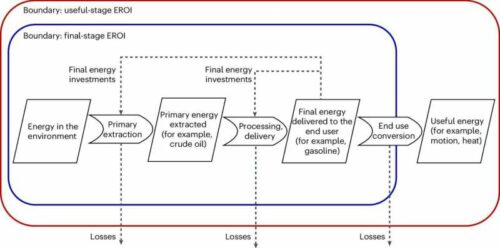The researchers at the University of Leeds carried out a study to examine the legitimacy of worries about the net energy yield of renewable energy systems versus fossil fuels.

Energy researchers have been exploring the implications of transitioning entirely to renewable energy for decades. Previous studies have raised concerns that technologies like solar panels and wind turbines may not produce as much net energy—the amount left after deducting the energy used to generate power—as traditional fossil fuel-based systems.
The researchers at the University of Leeds conducted a study published in Nature Energy to investigate the validity of concerns regarding the net energy output of renewable energy systems compared to fossil fuels. Their analysis aimed to determine if the transition to sustainable energy technologies indeed decreases net energy production. The findings suggest that shifting towards renewable energy might not necessarily reduce net energy availability.
Previous studies have typically measured the energy returns of fossil fuels at the initial extraction stage (i.e., the energy sourced from oil wells or similar extraction points). Conversely, the energy returns from renewable energy systems are usually calculated at the final stage of energy delivery to consumers (i.e., the energy provided as electricity).
These studies have often concluded that fossil fuels yield substantially more usable energy than renewable sources. However, recent research, including a 2019 article in Nature Energy, suggests that the gap between fossil fuels and renewables narrows significantly when energy returns are assessed at the same final stage. Nonetheless, these studies still overlook certain aspects that can only be evaluated by analyzing the energy at the ‘useful energy’ stage.
In their recent research, the team examined data from the International Energy Agency to measure the direct energy consumption (i.e., on-site energy use) within the fossil fuel industry. Additionally, they utilized the Exiobase input-output model, a comprehensive database with monetary and energy-related data from 43 countries, to assess the indirect energy consumption (i.e., energy use throughout the supply chain) attributable to fossil fuels.
Reference: Emmanuel Aramendia et al, Estimation of useful-stage energy returns on investment for fossil fuels and implications for renewable energy systems, Nature Energy (2024). DOI: 10.1038/s41560-024-01518-6






